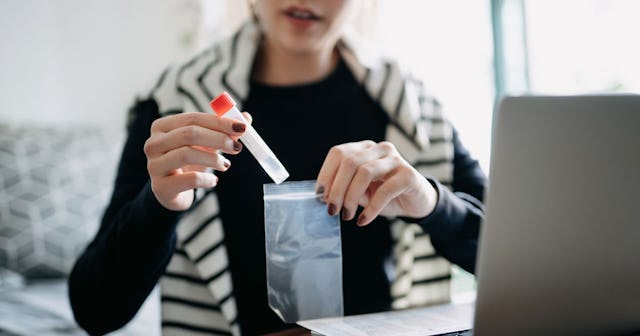At Home Covid Tests: How Accurate Are They, Really?

A few weeks ago my son woke up with horrific allergies. Well, at least that’s what I thought because the goldenrod has sprouted here in Maine and he has always had bad allergies this time of year.
But then his father pointed out that in order to be safe he should take an at-home COVID test just to be sure it was allergies and not something else. And he had a point. We’re in an unprecedented time where we can no longer safely assume that symptoms are “just allergies” or “just a cold.”
Since he works out in the public and comes into contact with people all day, it made sense to do this — especially because they are available in stores, they only take a second, and it’s a small step everyone should do whether you’ve been vaccinated or not.
It does feel good to have peace of mind and know that these tests are now available with fast results, and his was negative. But just to be sure, since it was our first foray into at-home testing, we took him to the doctor’s office to get a test as well. The nurse told us if we didn’t hear back, it was good news.
The negative at-home test ended up being accurate — we got the same result from the doctor visit.
Circle Creative Studio/Getty
However, when anything new hits the market (and is as important as detecting COVID), we want to know how trustworthy they really are, and which ones are most reliable if we need one. Even if you are vaccinated, it’s a good idea to keep a few on hand since cold and flu season is almost here. It will make your life easier if you don’t want to run to the pharmacy every time someone in your family has symptoms. Not to mention that the new Delta Variant is taking its toll and infecting people (even if they have received their vaccination).
The CDC reports the Delta Variant is “more than 2x as contagious as previous variants” and can make you even sicker than other variants. While unvaccinated people are at the greatest risk to get this strain of COVID, there have been cases in people who were vaccinated, which makes at-home testing even more crucial.
The Washington Post reports there are lots of different rapid antigen tests (approved by the FDA), which experts recommend. These tests can be taken at home, show you your results in about fifteen minutes, and are able to actually detect the virus — unlike antibody tests, which only detect if you’ve had the virus or you have been vaccinated. Antibody tests will not detect if you are currently infected, and it takes almost two weeks to get a result back.
Some tests that will detect the virus and get you results in minutes, according to The Washington Post, are: Abbott BinaxNOW, Ellume Covid-19 Home and Quidel QuickVue tests.
Yale Medicine says,”antigen test sensitivity varies depending on the time in the course of one’s infection, but is considered to have moderate to high sensitivity during peak viral load. Compared to molecular tests, antigen tests are more likely to generate false negative results, especially when performed on people who don’t have symptoms.”
Justin Paget/Getty
In other words, they are more accurate if someone has symptoms so it’s a good idea to take a few tests within a few days of each other to avoid getting a false result.
As great as these at-home testing kits are, everyone should know the most accurate way to screen for COVID is by going to your doctor’s office, pharmcy, or closest testing location and getting a molecular (or polymerase chain reaction) test. And since the cost of at home tests can add up, this might be your best bet. Although, if you can’t afford an at-home test, you can check within your community for places giving them out for free. In Ohio, for example, the state’s Department of Health has made at-home COVID test kits available for free at public libraries, health departments, and community health centers.
Dr. Martinello tells The Washington Post, “PCR tests are considered the most accurate available. But because these tests are highly sensitive and specific, there is still a risk for a false positive.”
Because these tests are done by those who are trained, then sent off to a lab, it will probably take anywhere from a day to a week to get your results back.
While there aren’t any PCR tests available over the counter now, however, they are expected to be this fall.
If you are headed to the pharmacy to get an over-the-counter test to use now, or to keep for the future, remember to check the packaging to make sure the test is approved by the FDA by looking at the packaging, or checking here.
At-home tests are also great to use if (a day or so after) you have been exposed to someone with COVID, have been in a crowded place recently, or you are going to be traveling.
So the next time you go out, pick up a couple — but remember, for now, the most accurate way to screen for COVID is by going to a healthcare professional and getting a PCR test.
This article was originally published on